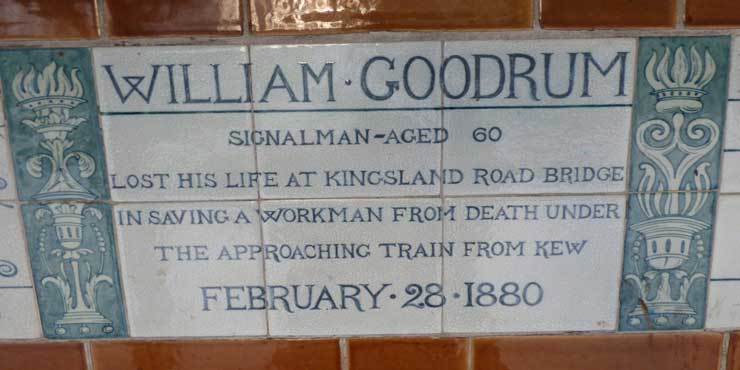
The tragedy of some of those remembered on the Watts memorial in Postman's Park is just how little attention was paid, at the time, to the sacrifice that they had made.
It is interesting to contrast how some of the "everyday heroes" caught the imagination of the press and public at large - and subsequently the story of their deaths received extensive media coverage; whilst others faded into obscurity within days of their deaths, and would have been long-forgotten had it not been for the fact that they found their way onto the wall in Postman's Park.
A very good example of this is William Goodrum (1820 - 1880).
His Postman's Park Memorial reads, "William Goodrum, Signalman, Aged 60, Lost His Life At Kingsland Road Bridge In Saving A Workman From Death Under The Approaching Train From Kew. February 28th 1880."
And, in essence, that is just about al that was reported about the death of William Goodrum.
Unlike some of the heroes, there were know poems composed in his honour.
No subscription - as a far as can be ascertained - was raised on behalf of his bereaved widow.
Indeed, as far as posterity goes, William Goodrum was the ultimate everyday, humble hero.
So much so, that his death seems to have passed alost unnoticed.
A few newspapers afforded him a brief paragraph providing a brief outline of the tragic circumstances behind his death.
The above headline for example, was how the article about him opened in Dundee Peoples Journal on 6th March 1880.
A week later, the Weekly Irish Times carried the following report on the inquest into his death in its edition of on 13th March 1880:-
"Recently Mr. John Humphreys held an inquest on the body of William Goodrum, aged 60, a flagman in the employ of the North London Railway Company.
On Saturday a gang of men were told off to clear the gutterings of the Kingsland-road bridge, deceased being appointed flagman to watch the four lines of metals and give notice of the approach of the trains.
At 1.30 an up train from Kew was approaching, and the deceased signaled the men to clear out.
One man did not hear the warning and continued to work, whereupon the deceased stepped on to the rack of the coming train, shouted loudly, and waved his arms.
He succeeded in saving the life of the labourer, but was himself unable to get back to the six-foot.
He was knocked down by the engine buffer and instantaneously killed.
A verdict of "Accidental death" was recorded by the jury."